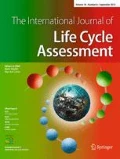Abstract
Purpose
To support life cycle-based EU policies, the European Commission created the “European Platform on Life Cycle Assessment (EPLCA).” The platform aims at providing coherent and quality-assured life cycle data, methods, and studies. The LCA Resources Directory (RD), one of the deliverables of the EPLCA, has so far consisted of lists of services, tools, databases, and providers. It has been decided to extend its scope to contain a section on LCA studies with metadata to characterize them. The research question addressed in this paper is “which structure and features should the RD have to store LCA studies so that it can efficiently support and promote robust Life Cycle Thinking practices?”
Methods
Existing tools with similar aims and objectives have been identified and analyzed to identify current performances and missing functionalities. A literature review concerning LCA studies in scientific and technical literature has been carried out in order to define relevant and consistent patterns. Following this analysis, it has been decided to develop a collaborative platform and an original structure has been proposed for the new section. The structure has been tested with a few LCA studies.
Results
A new collaborative web platform of the resources directory has been developed and launched online. Contributors are now able to characterize LCA studies according to 43 fields of metadata, distributed among seven categories: general, goal, scope, inventory, impact assessment, interpretation, and review and compliance. Some fields are mandatory, and the fill-in boxes are either enumeration list or free text. The platform also contains a search tool to identify relevant LCA studies with their metadata. The administrator of the directory performs a consistency check before entries are shared with others.
Conclusions
The EPLCA now contains a new collaborative web platform where LCA studies can be characterized and stored. It has been possible to identify a list of criteria for which LCA studies should be characterized. These criteria form the structure of the platform. It is too early to assess the actual usefulness of this new platform; this will be possible only when the directory is populated by contributors. With this new section in the RD, the EPLCA expands its aim of promoting Life Cycle Thinking and robust practices.
References
AFNOR (2011) General principles for an environmental communication on mass market products—part 0: general principles and methodological framework. June 2011. ISSN 0335-3931, Beuth
BSI (2011) PAS 2050:2011, specification for the assessment of the life cycle greenhouse gas emissions of goods and services. ISBN 978 0 580 71382 8
Communication from the Commission to the Council and the European Parliament (2003) Integrated product policy: building on environmental life-cycle thinking (COM (2003)302); Brussels 2003
Communication from the Commission to the European Parliament, the Council, the European Economic and Social Committee and the Committee of the Regions (2001) A resource-efficient Europe—flagship initiative under the Europe 2020 strategy. Brussels, 2011
European Commission (2011) European Commission—Joint Research Centre—Institute for Environment and Sustainability: International Reference Life Cycle Data System (ILCD) Handbook—Recommendations for Life Cycle Impact Assessment in the European context, 1st ed. November 2011; EUR 24571 EN. http://lct.jrc.ec.europa.eu/pdf-directory/Recommendation-of-methods-for-LCIA-def.pdf. Accessed on 02/02/2012
Finnveden G, Hauschild MZ, Ekvall T, Guinée J, Heijungs R, Hellweg S, Koehler A, Pennington D, Suh S (2009) Recent developments in life cycle assessment. J Environ Manage 91(1):1–21
ISO 14040 (2006) Environmental management—life cycle assessment—principles and framework; 1st ed.; 2006
ISO 14044 (2006) Environmental management—life cycle assessment—requirements and guidelines; 1st ed.; 2006
Pennington D, Wolf MA, Bersani R, Pretato U (2007) Overcoming barriers to the broader implementation of life cycle thinking in business and public administration. Int J Life Cycle Assess 12(7):458–460
Acknowledgments
This work has been partly supported by DG ENV of the European Commission. We gratefully thank Fulvio Ardente, Nathan Pelletier, Karen Allacker, Marco Recchioni, and Camillo De Camillis for inputs concerning the structure and functionalities of the resource directory. Thank you to Nathan Pelletier and Susanna-Michelle Van Andel for the editorial inputs. We also thank Patrick Arnold, Konstantins Bogucarskis, and Marco Guaita for the IT support.
Conflict of interest
The authors declare no conflict of interest.
Author information
Authors and Affiliations
Corresponding author
Additional information
Responsible editor: David Pennington
The views expressed in the article are personal and do not necessarily reflect an official position of the European Commission.
Rights and permissions
About this article
Cite this article
Sanfélix, J., Mathieux, F., de la Rúa, C. et al. The enhanced LCA Resources Directory: a tool aimed at improving Life Cycle Thinking practices. Int J Life Cycle Assess 18, 273–277 (2013). https://doi.org/10.1007/s11367-012-0468-x
Received:
Accepted:
Published:
Issue Date:
DOI: https://doi.org/10.1007/s11367-012-0468-x

